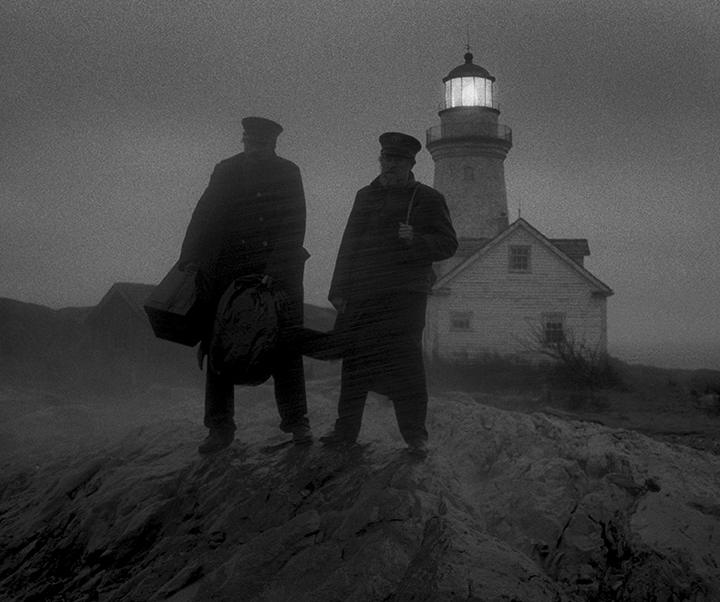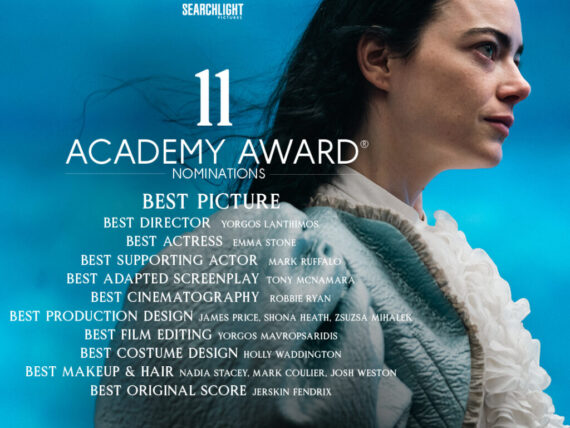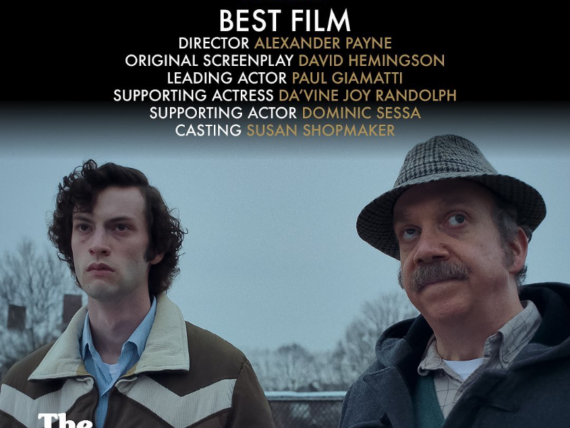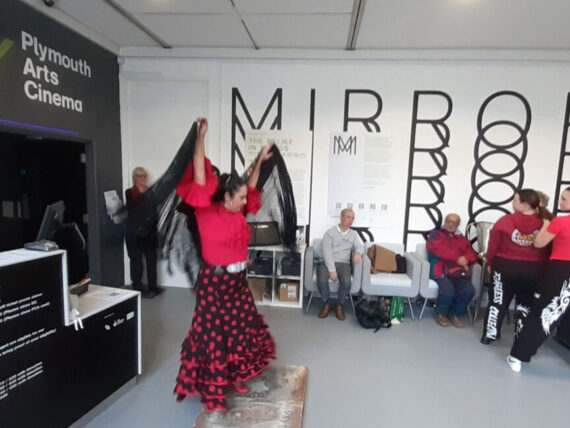Helen Tope reviews The Lighthouse, showing in our cinema for one last screening on Wednesday 4th March [only a few tickets left].
A comedy in the deepest shade of black, The Lighthouse is Robert Eggers’ follow-up to cult favourite, The Witch. Borrowing from the Edgar Allan Poe story, director and screenwriter Robert Eggers, along with his brother Max, draw on influences as diverse as classic horror and American Gothic.
Set in the 1890’s, the film tells the story of lighthouse keeper Thomas Wake (Willem Dafoe), as he is joined by new recruit, Ephraim Winslow (Robert Pattinson). As an experienced New England keeper, Wake is none too pleased with his latest colleague.
Prim, sober and God-fearing, Winslow is young, but weighed down with secrets. Wake distrusts him from the start, and gives him the dirtiest, hardest jobs in the lighthouse keeper’s remit.
Ephraim Winslow, we eventually learn, is not his real name. Born Thomas Howard, the Winslow name has been taken from Howard’s previous employer. Having failed to stop an accident where Winslow was killed, Howard’s guilt – taking Winslow’s name and identity to gain employment – is alleviated as he tells his story to Wake. But rather than finding solace, Wake brushes him off – he should not have told him anything.
We see Howard and Wake in their day-to-day routine, and it’s clear the burdens are not equally shared. Howard’s hopeless cycle of mend and repair fails to make even the slightest difference to their standard of living. The keepers’ cottage is barely habitable – water leaks in through the roof as they try to sleep. Wake hoists Howard over the side of the lighthouse to scrub its outer walls. The rope snaps and Howard falls to the ground. It is no wonder that, after days of swallowing down brackish water, Howard accepts Wake’s offer of lighthouse liquor.
While Howard gets lumbered with the back-breaking tasks of lighthouse maintenance, Wake revels in his supervisory role. The light is mine, he gleefully tells the younger man. It is directly against workplace regulations – the manual, which Howard frequently quotes, states that the lighthouse should be tended to by both men. Wake’s refusal to share infuriates Howard. The light becomes the pressure point between them. The lantern room is Wake’s private space, and Howard becomes obsessed with what he is missing. As the men fill their nights with booze, the alcohol stops being a friend and induces mania in Howard – his sense of reality begins to slip, and his fantasies and dreams blur into a nightmarish whole. Howard struggles to hold onto his sanity. Awake, asleep. He must know the secret of the light.
Eggers’ sparsely-worded script weaves in maritime notes of superstition and makes them the subject of Howard’s psychosexual hallucinations. Finding a tiny scrimshawed mermaid buried in his mattress, she becomes a cipher, leaping from masturbatory fixation into Howard’s dreams where he’s convinced she has washed up on the beach. The island’s gull population don’t take kindly to Howard either, and despite Wake’s warnings, Howard in a temper kills one of the birds. The wind changes and a storm approaches. Wake curses Howard – he has brought nothing but bad luck with him.
A film of brilliant technicality, The Lighthouse is, in itself, a compelling argument for why film should continue to be watched on the big screen. Shot in 1.19:1 ratio, the action is further compressed in projection, adding to the film’s sense of claustrophobia. Eggers’ cinematographer Jarin Blaschke uses the film’s palette of black and white to create a complex, densely-textured world. Far from being limiting, being shot in monochrome allows the psychological drama to implode without feeling showy. Adopting expressionist lighting techniques, Blaschke renders Pattinson and Dafoe at times almost unrecognisable.
The seascape – a language all too familiar in art house cinema – dominates this film with an extraordinary presence. Eggers’ shots of jagged rocks and pounding seas are not only astonishing, their ability to become metaphor is only made possible by scale. While streaming services like Netflix are doing great things in terms of accessibility, films like The Lighthouse need to be watched in a theatrical setting. Eggers’ fable is a story so large it demands your absolute attention. At home, giving into distraction is far too easy. In a darkened room, with friends and strangers, Eggers has you exactly where he wants you.
As the story grows, and we begin to doubt what we see, the physicality of the film helps to ground us. Eggers’ interiors are, of course, beautifully shot, but more than that, we feel the heaviness of the lighthouse itself. The machinery clanks and heaves, the deafening boom of the siren pricks the narrative – whether it sounds in agreement or admonishment is open to debate.
A film of extremes demands a skilled cast, and Eggers’ first choices – Robert Pattinson and Willem Dafoe – deliver nuance and empathy in these larger-than-life roles. As the poetry-spouting keeper, Dafoe treads between kindly paterfamilias and a harsh patrician who rules the island as if born to it. Pattinson’s Howard is a man so tightly wound that his unravelling becomes a grim inevitability.
The relationship between Wake and Howard deteriorates further, as Howard’s planned departure from the island is put on hold as a storm covers the entire area. Running out of food, they are forced to eat grass until Wake remembers a crate of provisions he had buried in case of emergencies. They dig it up – it is another crate of alcohol.
Dafoe and Pattinson are not the most obvious choice for a double act, but their chemistry is superb. Moving from chilly awkwardness at the dinner table, to a chummy laddishness as the booze kicks in, Dafoe and Pattinson capture the frustration of living in close quarters. Their evenings of drunken dancing shift from an Ernest Hemingway jollity, to notes of panic and discord as Wake leans forward to kiss Howard. Father. Lover. The lines begin to merge.
Wake’s fondness for poetry and flatulence would make him a challenging room-mate for anyone, but it is as Howard’s mind slips from petty annoyances, into darker thoughts, that The Lighthouse begins to change direction. The final scenes between Howard and Wake are truly shocking, and their confrontation soon turns deadly. Working from Poe’s unfinished story, Eggers completes it by escalating the horror, pitching us into a coda of bleak and final resolution.
As a psychological study, The Lighthouse manages to be both deeply funny and profoundly disturbing. It will also put any of your workplace woes into sharp perspective. A voyage into anarchy, The Lighthouse gives licence to our deepest fears and unspoken desires.
Helen Tope









Comments
No comment yet.